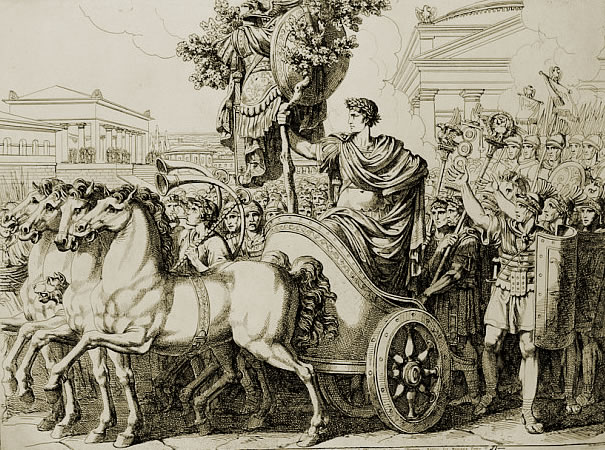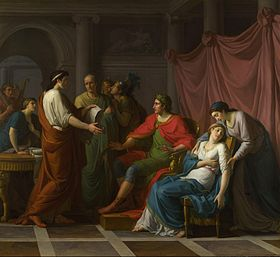8.3 Vergil, Aeneid, Book 6, Lines 847-899
6 min read•june 18, 2024
Mick Polito
AP Latin 🏛
24 resourcesSee Units
Lines 847-899
Book IV of the Aeneid concludes with Anchises commenting on the bright future of Romans to Aeneas while grieving Marcellus the Younger in the presence of his Elder. Take note of the conclusion of Anchises’s dialogue and notice what skills Rome will require in the future.
👉View these lines in Latin first if you'd like here - Lines 847-899 Annotated! Don't worry though, we will be breaking down the lines that we think are most important below.
Before we dive into breaking down the Latin lines into the text, so we can more clearly comprehend it, we will answer some questions based on the designated skill categories! The skill categories for these lines are Reading and Comprehension and Argumentation so be aware of that when you answer these questions and read the passages. Some of these answers are based your own opinion, so if you share something similar, you’re likely on the right track for comprehension!
Lines 854-859
Sic pater Anchises, atque haec mirantibus addit:
“aspice, ut insignis spoliis Marcellus opimis
ingreditur victorque viros supereminet omnes.
hic rem Romanam magno turbante tumultu
sistet eques, sternet Poenos Gallumque rebellem,
tertiaque arma patri suspendet capta Quirino.”
- Based on your knowledge of Roman history and the text, where has Claudius Marcellus shown up before?
- Why do you think Marcellus’s military strength is emphasized in these lines?
- Why do you think Anchises described Marcellus as “turbulent with fierce confusion”?
- What is referred to as the “Supreme Prize” as line 2?
- Why are the Gauls referred to as “rebellious” when Carthage is predominantly known for their action in the Punic Wars?
Answers (don’t peek 👀!)
- Hero of the Second Punic War: Claudius Marcellus was elected five times to the Roman consul and an important Roman general during the Second Punic War. The spolia opima was given with respect to his hand-to-hand combat skills when killing a Gallic military leader named King Viridomarus in 222 BC at the Battle of Clastidium.
- To emphasize the strength of Romans in both war and politics: This was previously explained in lines 847-853 (if you didn’t catch that when sight-reading, I suggest going back to find it). The Greeks, on the other hand, would-be masters of art and science. Claudius Marcellus has shown his own integrity and honor to the Roman army when he died in battle, giving everything he had to the Roman citizens. The spolia opima sparked a rush for military conquests and achievement within warfare. In turn, because of its prominence previously, there’s no reason with the same type of ethic that it shouldn’t continue if Anchises’s foretelling is correct. Notice that this military emphasis continues within this section of lines as you read further.
- Marcellus the Elder was driven primarily on winning the war. The whole basis of the Punic Wars was primarily expansionary advancements and control--what side would have the strongest military and therefore control the resources and trade of Mediterranean. The soldiers fought for Rome in honor, not because they were reaping benefits of the war. Those benefits went to the wealthy and those in the aristocracy. It was clearly either Carthage or Rome earning the sphere of influence within that region, and eventually, Rome won and left Carthage powerless in the aftermath. This pattern of war and expansion continues for the Roman Empire throughout its lifespan.
- The spolia opima: This was the most prestigious award a Roman general could earn.
- In the Second Punic War, famous Carthaginian general Hannibal Barca utilized Gallic mercenaries in a series of invasions, playing a role in some victories as well. Therefore, they could be referred to as “rebellious,” since Carthage and Rome were the two “heavyweights,” and Gaul joined in on the side of Carthage in an attempt to sack Rome.
Lines 875-881
nec puer Iliaca quisquam de gente Latinos
in tantum spe tollet avos, nec Romula quondam
ullo se tantum tellus iactabit alumno.
heu pietas, heu prisca fides invictaque bello
dextera! Non illi se quisquam impune tulisset
obvius armato, seu cum pedes iret in hostem
seu spumantis equi foderet calcaribus armos.
Translate these lines as literally as possible
Translation (don’t peek👀!)
No boy of the line of Ilium shall so exalt his Latin ancestors by his show of promise, nor will Romulus’s land ever take more pride in one of its sons. Alas for virtue, alas for the honour of ancient times, and a hand invincible in war! No one might have attacked him safely when armed, whether he met the enemy on foot, or dug his spurs into the flank of his foaming charger.
Remember if you have different words that I did, that’s perfectly acceptable! Just make sure they have the same meaning attached to them.
Breakdown of Lines 847-899 🔎
- Anchises moves on from the historical and cultural and his own foretelling of history to his own beliefs of the Romans (if you haven’t sight-read those sections, you can really gain some prominent contextualization skills there). Anchises believes that although the Romans won’t specialize in the arts and sciences, “hammer out bronze that breathes more delicacy than us,” or “scans with instruments the movement of the skies,” they will become through their military and “command the nations with your power” and politics: “crown peace with law”
- Anchises shifts his focus to a spotted Claudius Marcellus. He was a prominent war general during the Second Punic War that was honored with the “Supreme Prize," the spolia opima. Aeneas then spotted an individual walking beside him, but not “joyful” and with “his eyes downcast”. Anchises informed him that it was his own son, and his undeniable “presence he had,” but unfortunately “sad shadows hovered around his own head”.

Marcus Claudius Marcellus being celebrated for his military success and being granted the spolia opima, the highest honor a military general in Rome could receive. Image Courtesy of Rome and Art.
- Marcellus the Younger was Augustus Caesar’s nephew and became a well-known politician because of it, but sadly died before he could have had his chance to the throne of an illness that spread throughout Rome. The “Fates will only show him the world” explains how brief his life truly was and how he was “not allow[ed] to stay longer.” Along with the other figures that Rome had, Rome would have been too powerful in they eyes of the gods if he was allowed to live. Vergil makes it seem like his death was a required act by the gods.
- The next few lines explain Marcellus’s funeral where Augustus’s tomb is held in “The Field of Mars." Marcellus was the first occupant of this “new-made tomb.” He will be so honored by ancestors and future Romans by his show of promise that “Romulus’s land” will not “ever take more pride in one of its sons.”

Octavia fainted about the lines about her son during a private recitation with Vergil. Image courtesy of the National Gallery.
- Anchises again refers to his talented skill in warfare, and how unfair for enemies his tactics were. It could have been only better if he had survived longer. Anchises fears that if Aeneas can’t escape his own fate of dying young, he will be a Marcellus himself, although nothing can change it.
- Anchises finishes his review of the future Romans and Aeneas is informed about “the wars he must soon fight" with the Laurentine peoples and those of the city of Latium, and how he might tackle each situation.
- There are two gates to leave the Underworld; that of the horn which is an easy passage, while the ivory gate sends “false dreams to the world above” by the Gods of the Dead. Sibyl and Aeneas meet up with Anchises, take the Ivory gate, and rejoin his people at the shore.
And that's it for our Latin reading for the course! Now we'll be finishing off the material with the English readings for Books 8 and 12. So keep going with us, we're just about done!
Browse Study Guides By Unit
🔥Unit 3 – Vergil, Aeneid, Book 2
🏇Unit 4 – Caesar, Gallic War, Book 4
👑Unit 5 – Vergil, Aeneid, Book 4
☠️Unit 8 – Vergil, Aeneid, Books 6, 8, & 12
⚔️Unit 1 – Vergil, Aeneid, Book 1
🥗Unit 2 – Caesar, Gallic War, Books 1 & 6
🥊Unit 6 – Caesar, Gallic War, Book 5, Part I
🧄Unit 7 – Caesar, Gallic War, Book 5, Part II, Book 6, & Book 7
📚Study Tools

Fiveable
Resources
© 2025 Fiveable Inc. All rights reserved.